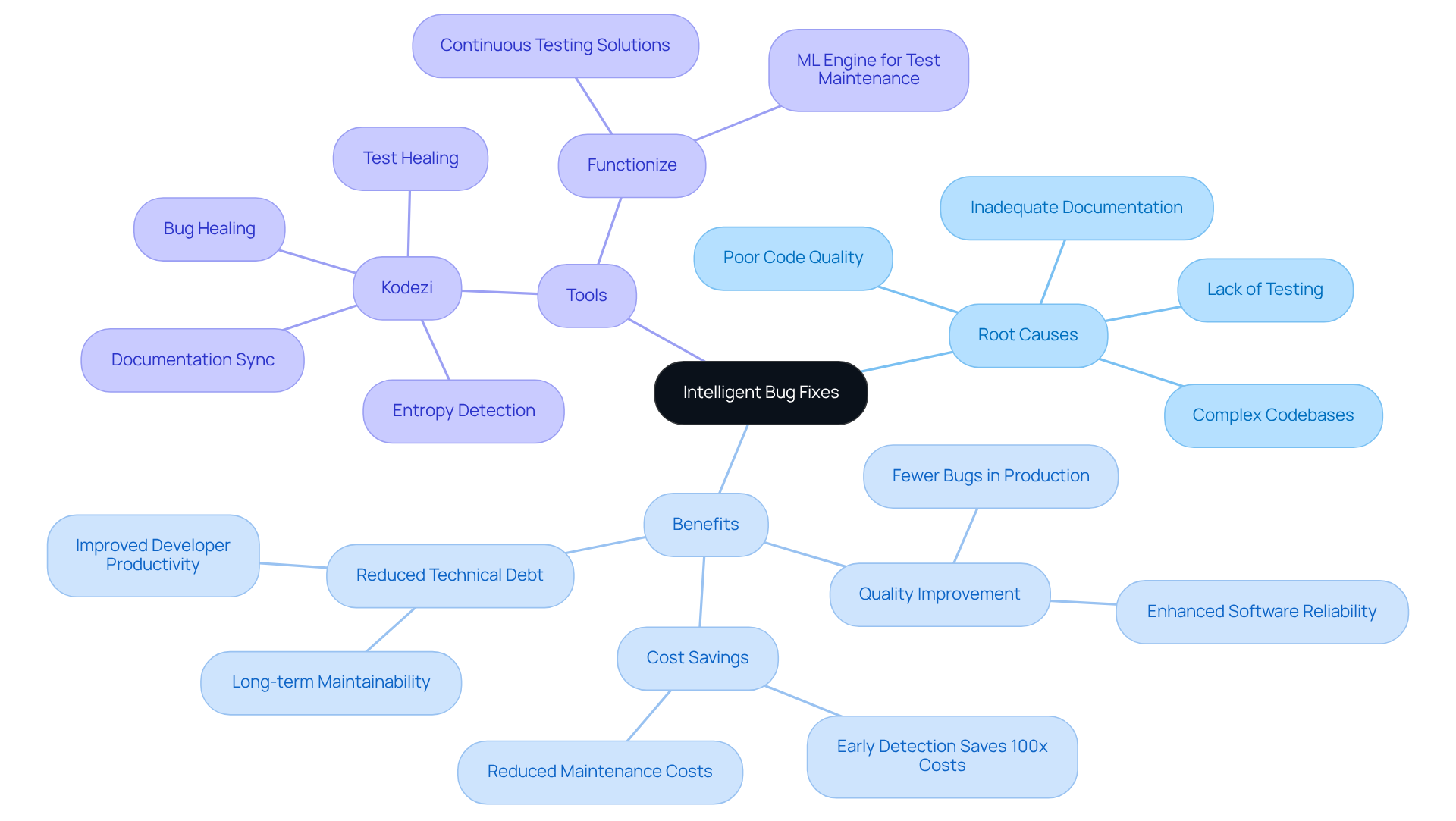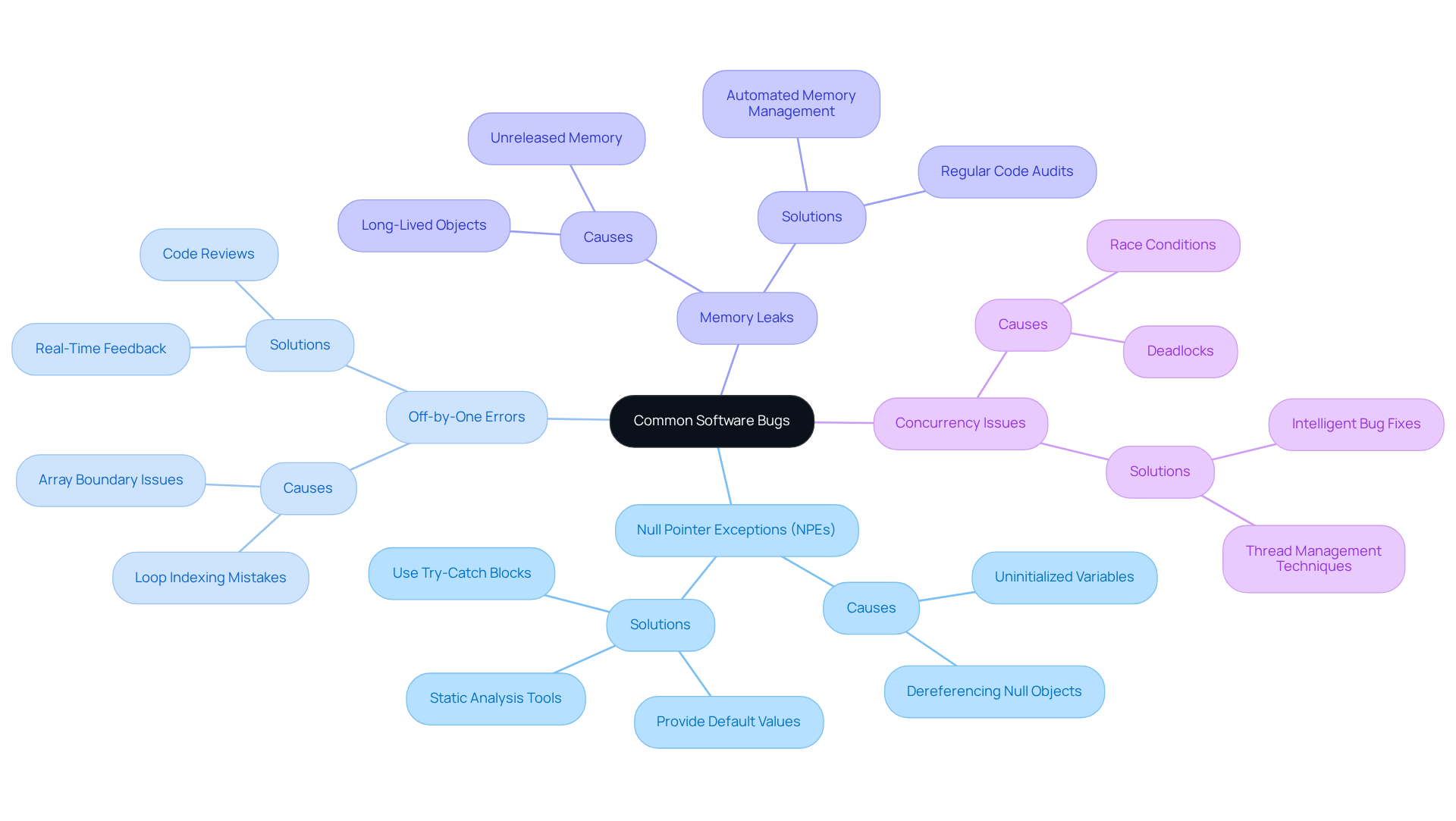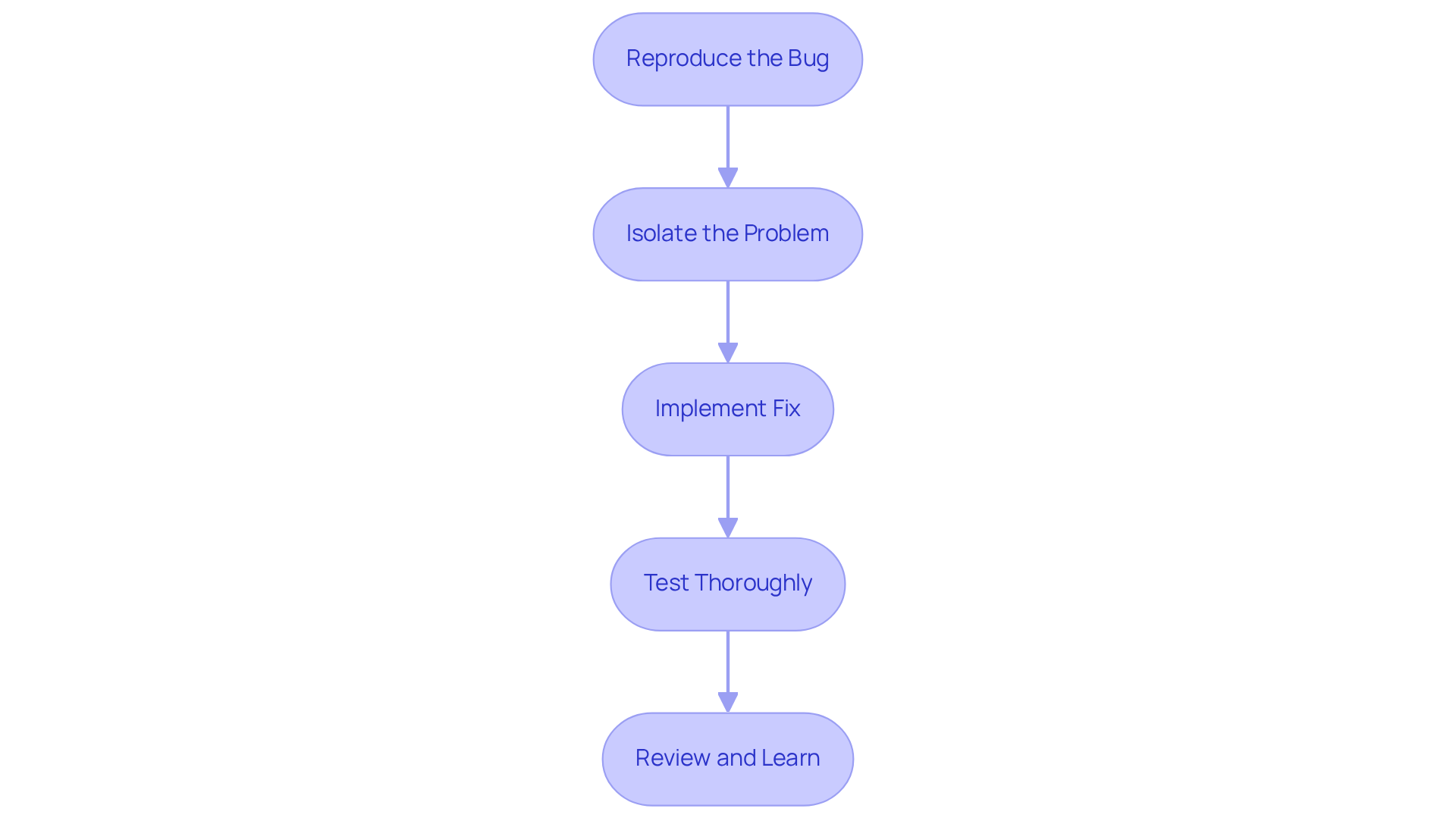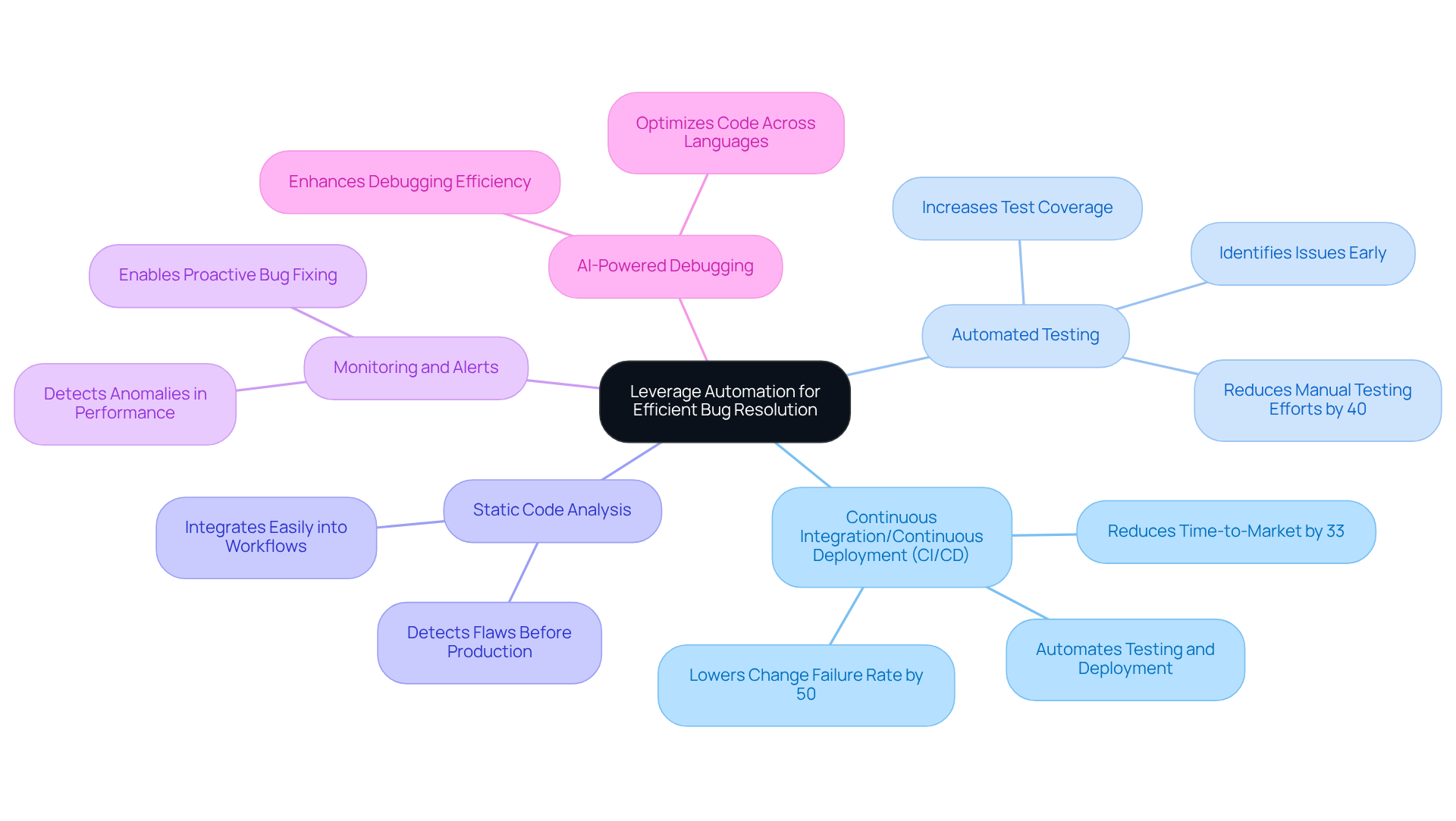Overview
In the realm of software development, developers frequently encounter various coding challenges that can hinder their progress. How can these issues be effectively addressed? Kodezi offers innovative solutions designed to tackle these common pain points, particularly through its intelligent bug-fixing strategies.
The article outlines five key strategies for implementing intelligent bug fixes, emphasizing the significance of addressing root causes and utilizing automation to enhance code quality. Methods such as:
- Reproducing bugs
- Isolating problems
- Leveraging tools like Kodezi's CLI for automated testing and debugging
These approaches not only streamline the debugging process but also collectively reduce maintenance costs and improve overall productivity.
Why should developers consider integrating Kodezi into their workflow? The benefits are clear: enhanced productivity and improved code quality lead to a more efficient development process. By adopting Kodezi's tools, developers can focus on creating robust software without being bogged down by recurring issues.
In conclusion, exploring the tools available on the Kodezi platform could significantly transform your coding practices. Are you ready to elevate your development experience? Discover how Kodezi can help you overcome coding challenges and achieve greater success.
Introduction
In the fast-paced world of software development, developers often encounter the daunting challenge of achieving flawless code amidst a frustrating cycle of bugs and fixes. Intelligent bug fixing goes beyond simple error correction; it provides a strategic framework that not only addresses immediate issues but also enhances the overall quality and maintainability of software. As development teams grapple with the challenge of preventing recurring problems, they may wonder: how can they adopt practices that effectively resolve bugs while fostering a culture of continuous improvement? This article explores five key strategies for implementing intelligent bug fixes, demonstrating how proactive measures can transform coding practices and elevate software reliability.
Understand Intelligent Bug Fixes
Clever bug fixes extend beyond simply correcting programming errors; they embody a strategic approach that significantly enhances software quality and maintainability. Have you ever considered the underlying reasons for errors in your code? By identifying these root causes and implementing preventive measures, development teams can ensure that fixes do not inadvertently create new issues. This proactive mindset not only boosts software reliability but also reduces technical debt and nurtures a culture of continuous improvement.
Research reveals that addressing bugs early in the software development lifecycle can save up to 100 times the cost of fixing them later. This statistic underscores the critical importance of adopting intelligent bug fixes. Furthermore, the Command Line Interface (CLI) exemplifies this strategy by autonomously improving codebases, resolving performance bottlenecks, ensuring security compliance, and optimizing code formatting and exception handling before issues reach production.
Organizations that embrace Kodezi's strategic approaches frequently experience reduced maintenance costs and increased overall productivity. Case studies highlight its bug healing and test healing features, showcasing tangible benefits. Ultimately, incorporating intelligent bug fixes into your development process not only enhances software quality but also adheres to best practices for sustainable software maintenance. Why not explore the tools available on Kodezi's platform and see how they can transform your coding practices?

Identify Common Software Bugs
Coding challenges are a common hurdle for developers, often manifesting as frustrating bugs that can hinder progress. These issues can include syntax errors, logical flaws, performance bottlenecks, and security vulnerabilities. Recognizing these frequent pitfalls is essential for effective software development.
Null Pointer Exceptions (NPEs) are a prevalent issue, often arising from uninitialized variables, which can lead to application crashes. Kodezi's AI-driven tool autonomously examines and applies intelligent bug fixes, ensuring that your code is robust from the outset.
Similarly, Off-by-One Errors frequently occur in loops and array indexing, resulting in unexpected behavior. With Kodezi, developers receive real-time feedback and recommendations to avoid such errors during coding.
Memory Leaks can degrade performance over time when allocated memory is not released. Kodezi's command-line interface independently enhances your codebase by detecting and resolving potential memory leaks before they reach production.
Furthermore, Concurrency Issues arise in multi-threaded applications, leading to race conditions and deadlocks. The debugging features of Kodezi provide intelligent bug fixes that assist teams in effectively identifying and addressing these problems, thereby improving overall application stability.
By acknowledging these common issues, development teams can implement focused strategies to prevent them, such as:
- Comprehensive reviews
- Automated testing
- Continuous integration practices
Leveraging Kodezi's advanced features can significantly enhance programming productivity and lead to intelligent bug fixes that improve code quality. Why not explore the tools available on the platform and see how they can transform your coding experience? Kodezi is an essential asset for programmers across all industries.

Implement Best Practices for Bug Fixing
To effectively implement intelligent bug fixes, developers often face significant challenges. One of the most common barriers is the inability to reproduce bugs, as 41% of developers report. This issue can hinder quick resolutions and frustrate teams. However, by employing best practices, developers can achieve intelligent bug fixes to navigate these challenges more efficiently.
-
Reproduce the Bug: The first step in addressing any bug is ensuring it can be consistently replicated. This crucial phase not only aids in understanding the context and impact of the bug but also motivates developers to tackle the issue directly.
-
Isolate the Problem: Next, it’s essential to narrow down the specific section of code where the bug occurs. Utilizing debugging tools, such as the CLI, allows developers to trace the execution flow and pinpoint the root cause. Effective isolation techniques can significantly minimize debugging time, allowing for intelligent bug fixes and a focused approach to problem-solving.
Once the cause is identified, implementing intelligent bug fixes that resolve the issue without introducing new problems is vital. The CLI can provide valuable insights during this process, ensuring that the solution is well-documented for future reference and team understanding.
-
Test Thoroughly: After implementing the fix, extensive testing is necessary to confirm that the bug has been resolved and no new issues have emerged. Automated tests, supported by the CLI tool, enhance programming productivity and ensure compliance with security standards, all while maintaining high quality and minimizing regression risks.
-
Review and Learn: Finally, conducting a post-mortem analysis after fixing the error is essential. Understanding what caused the problem and how to prevent similar issues in the future can lead to continuous improvement in code quality. By leveraging Kodezi CLI's automated debugging features, teams can learn from past experiences and enhance their coding practices moving forward.

Leverage Automation for Efficient Bug Resolution
In the realm of software development, coding challenges can be daunting. Automation plays a crucial role in addressing these issues, particularly in the implementation of intelligent bug fixes. How can developers leverage automation effectively? Here are some strategies that can transform your workflow:
- Continuous Integration/Continuous Deployment (CI/CD): Implementing CI/CD pipelines automates testing and deployment processes. This approach ensures that issues are detected early in development, with organizations noting a considerable decrease in change failure rates.
- Automated Testing: Utilizing unit tests, integration tests, and end-to-end tests helps identify issues before they reach production. Automated testing frameworks maintain code quality over time, significantly increasing test coverage compared to traditional methods.
- Static Code Analysis: Tools like Kodezi CLI enhance your codebase independently, resolving issues before they enter production. With a quickstart demo, teams can easily integrate its capabilities into their workflow. These tools examine programs for possible flaws, identifying problems early and minimizing the need for extensive troubleshooting later.
- Monitoring and Alerts: Implementing monitoring solutions automatically detects anomalies in application performance and alerts developers to potential issues, enabling proactive bug fixing.
- AI-Powered Debugging: By leveraging Kodezi AI for code optimization and debugging across various programming languages such as Python, Java, JavaScript, C, and C++, the debugging process becomes more efficient and effective.
By integrating these automation strategies, teams can significantly enhance their processes for intelligent bug fixes. Imagine faster turnaround times and improved software quality—explore the tools available on the Kodezi platform to elevate your coding practices today!

Conclusion
In the realm of software development, coding challenges are a common hurdle that developers face. Adopting intelligent bug fixes is essential for enhancing the quality and maintainability of applications. This strategic approach transcends merely addressing errors; it focuses on understanding root causes and implementing preventive measures that foster a culture of continuous improvement. By prioritizing intelligent fixes, development teams can mitigate future issues, significantly reduce technical debt, and enhance software reliability.
How does Kodezi address these challenges? Throughout this article, several key strategies have been highlighted, including:
- Identifying common software bugs
- Implementing best practices for bug fixing
- Leveraging automation for efficient resolution
From recognizing prevalent issues like null pointer exceptions and memory leaks to utilizing tools like Kodezi's CLI for real-time feedback and automated testing, these insights empower developers to tackle challenges effectively. The emphasis on early detection and proactive measures illustrates how intelligent bug fixes can lead to substantial cost savings and improved productivity.
The significance of integrating intelligent bug fixes into the development process cannot be overstated. By embracing these strategies, teams can achieve not only higher code quality but also a more sustainable approach to software maintenance. As the landscape of software development continues to evolve, organizations are encouraged to explore the tools available on platforms like Kodezi. These tools can transform coding practices and enhance overall efficiency. Taking action now to implement these techniques will pave the way for a more resilient and effective software development lifecycle.
Frequently Asked Questions
What are intelligent bug fixes?
Intelligent bug fixes are a strategic approach to correcting programming errors that not only address the issues but also enhance software quality and maintainability by identifying root causes and implementing preventive measures.
Why is it important to identify the underlying reasons for errors in code?
Identifying the underlying reasons for errors helps ensure that fixes do not create new issues, boosts software reliability, reduces technical debt, and fosters a culture of continuous improvement.
How much can addressing bugs early in the software development lifecycle save?
Addressing bugs early can save up to 100 times the cost of fixing them later, highlighting the importance of adopting intelligent bug fixes.
What role does the Command Line Interface (CLI) play in intelligent bug fixes?
The CLI autonomously improves codebases, resolves performance bottlenecks, ensures security compliance, and optimizes code formatting and exception handling before issues reach production.
What benefits do organizations experience by using Kodezi's strategic approaches?
Organizations that embrace Kodezi's strategies often see reduced maintenance costs and increased overall productivity, as well as tangible benefits from features like bug healing and test healing.
How does incorporating intelligent bug fixes affect software quality?
Incorporating intelligent bug fixes enhances software quality and adheres to best practices for sustainable software maintenance.




